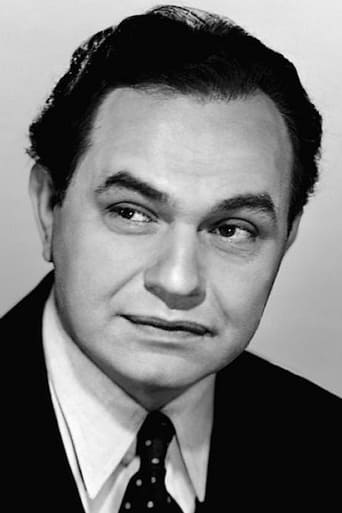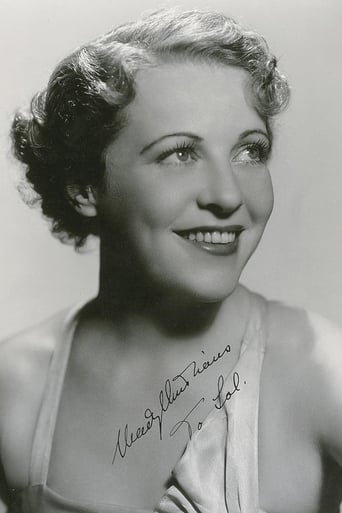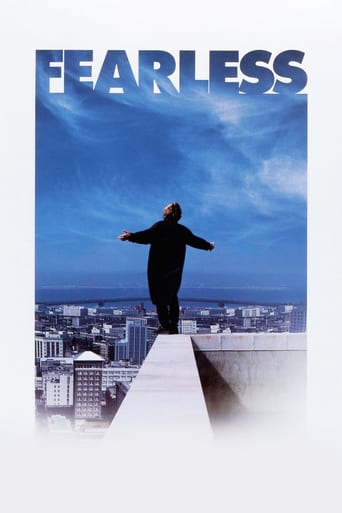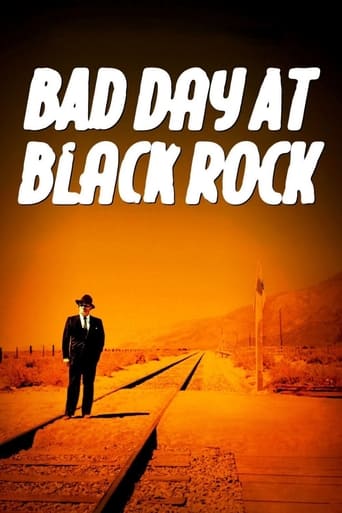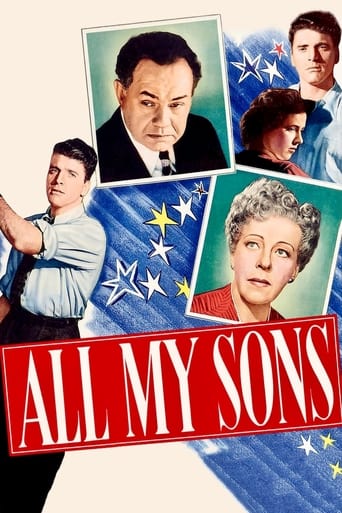

All My Sons (1948)
During WWII, industrialist Joe Keller commits a crime and frames his business partner Herbert Deever. Years later, his sin comes back to haunt him when Joe's son plans to marry Deever's daughter.
Watch Trailer
Cast
Similar titles
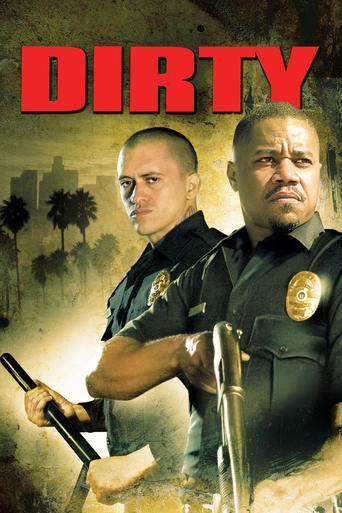
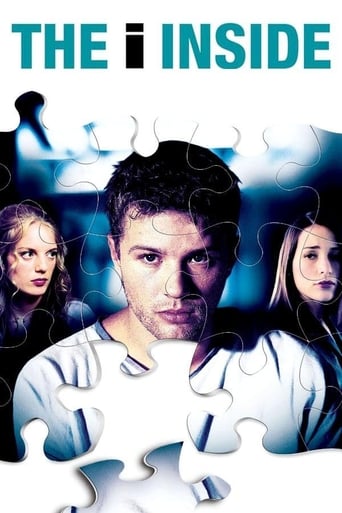
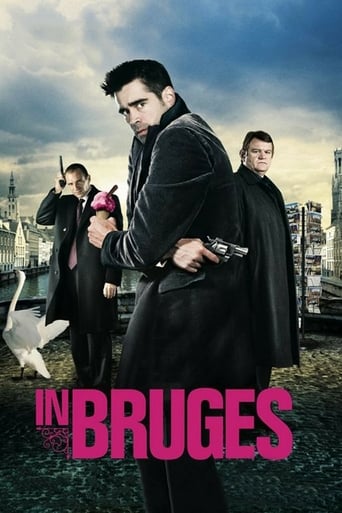
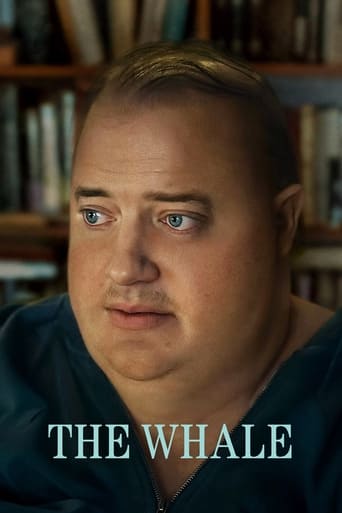
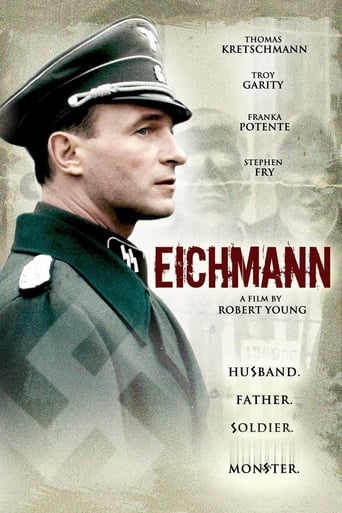
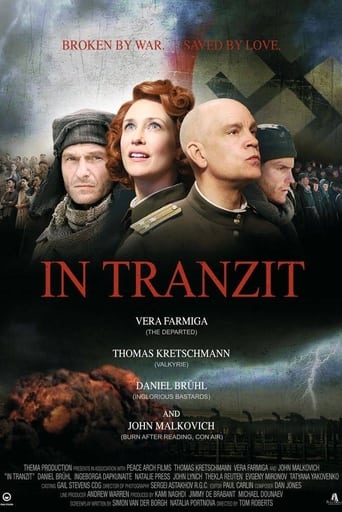
Reviews
Very disappointing...
Thanks for the memories!
People are voting emotionally.
Just what I expected
The play has undergone some changes :first of all, Herbert ,Ann's and George's father,appears in a scene in jail where Chris meets him:it adds strength to the screenplay,and Frank Conroy's tired disillusioned face conveys all the character's plight, a victim of his friend 's greed and cowardice.The scene in the restaurant is also a good plus: in the play,they hinted at people who "talked" about the shrewd Joe who got away :but in a movie,this despondent woman who lost her husband in the war shouting "murderer!" is more convincing.Some things were ruled out: no "apple tree whose upper trunk and branches lie toppled beside the slump";in the play ,it seems to me that mother was more obsessed by her missing in action son's return ,a death she never got over;although the horoscope's kept and there's this wardrobe full of his clothes with these polished shoes;in the movie,although she does not want Chris to marry his brother's fiancée ,she 's more concerned about her husband's family skeleton ;anyway ,the ending was sweetened :same final word ("live") but we do not see Chris and Ann leaving the house and thus living happily ever after. Sue 's role is less important:she "resents living next door to the Holy Family" in Miller's lines,she hates Chris' idealism ,which urges her husband to do medical research which "pays 25 dollars a week" ;in the movie ,she's a simply gossipy neighbor.Directing is not very inventive (just compare with what Kazan and Mankiewicz did with Tennessee Williams ),but the two principals are very efficient:EG Robinson portrays a double-faced self-made man brilliantly:he appears first as a good man,who,although uneducated ,made the grade and gave his family all that money could buy;but doubt creeps into our mind ,and after the scene in the plant - another sequence not from Miller's play- where "when you don't know,ask Joe" ,we realize he is a despicable coward,who shuns responsibility and is not afraid to send a man to jail.It explains the wife's attitude too: does she care for her son ,or for all "his " sons ?after all she did know that her husband's flu was an excuse .Lancaster is deeply moving in his portrayal of a son who discovers her father is not the one he has admired all his life .
Arthur Miller has always been my favourite playwright and All My Sons my favourite of all of his plays. The film version really impressed me as they were able to make the film come alive in an interesting, new and exciting way. The shots were meaningful, but not pretentious. The acting work of Edward G. Robinson as the tragic Joe Keller, was a poor casting choice, although his acting was inspired. The subtle ways his character would speak volumes without saying a word. Unfortunately because Robinson is not sympathetic it affects the impact of the end of the film. His acting choices were not the issue. The film needed (as another reviewer mentioned) a Spencer Tracy type. Someone the audience wanted to root for. Mady Christians (Kate Keller) had few lines but we rarely wondered what was going on in her head. She was spot on in her subtleties. All the performances were well done...but...There were two things that bothered me about the film.The first was noticeable, however forgivable. I found that the delivery by Burt Lancaster (who played Chris) sounded like he was trying to act on stage. He spoke the lines with pronounced enunciation and flair. He did not overact in any way, but the way he delivered his lines felt forced, felt like I was watching the performance rather than watching life unfold.The next was a disappointment for me. However, if you have not read the play you wouldn't notice it at all. The end of the play is quite emotional and whenever I read it (about once a year) I find that I weep uncontrollably. The film did not have the same emotional impact, likely in part due to casting, and although it was still tragic it somehow came across with less impact than the words on the page.I am a filmmaker myself and it has always been my dream to remake All My Sons once I have garnered enough experience to do it right. I hope one day to do it justice.
I saw this movie today for the umpteenth time and it finally occurred to me... Weren't both men to blame? Wasn't Herbert Deever really just as guilty as Joe Keller? No matter who "says" they are responsible, anyone involved in knowingly shipping faulty parts that could kill people is responsible. Deever shouldn't have sent them out, no matter what he was told. Isn't that what all those Nazis claimed when asked how they could commit so many atrocities? "I was just taking orders." That doesn't wash with me or with most people. We all have a responsibility to follow our own consciences with regard to right and wrong.They were both guilty....It's a wonderful story and very well performed and written, but that fact remains to be discussed.
A standard 1940's group of ensemble players, coupled with strength of an Arthur Miller project. All of the cast principles and minor players as well were at the top of their forms when they stood before the cameras. None were noted as powerful stage actors in their own right. Yet when they appeared in this film, they succeeded in doing what I think a film of a major stage work should do. Carry the viewer into the stage (not film) theater, and give him/her the unique experience of a Broadway or Off-Broadway theater seat.The production style and direction, (for reasons of cost and utility) let the words of Miller's play take center stage. The Art and Set direction, in beautiful black-and-white, are spare, firm, and commanding. They command our attention. Miller is big on attention to the issues his characters are grappling with and their impact on the great issues of our (and all) time.As Miller repeats in Death of a Salesman, there are layers upon layers of meaning and understanding between his characters and the issues they confront both internally and externally. The two business partners have had a long, intimate, family relationship (like Cain and Able). So close a relationship, that his son could have married his partner's daughter. And she of course, is the only one who has always known (from that son) the truth about the death of the son. And the truth(s) about the father.Miller shows us that the father's Horatio Alger lies are so much at the foundation of who we are individually and collectively as Americans; the they can almost completely wash out what individuals and a community should think about its leading citizens. It is an interesting plot twist that as Miller's script points out, it is the low class birth and poverty of the father embeds him into the fabric of the community.That the film faithfully carried Miller's message of contempt and loathing not only for the worship of that false god(capitalism), but also for the whole Horatio Alger hero myth (that both American liberals and conservatives embrace) is quite daring. Even for a film world that had not yet descended into the long night of the "Black-List".
